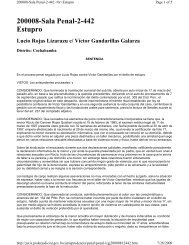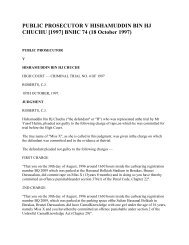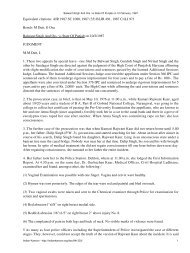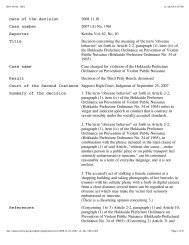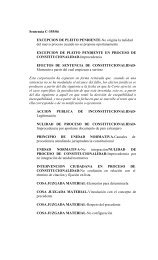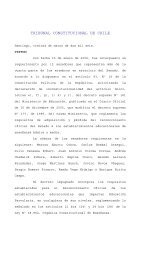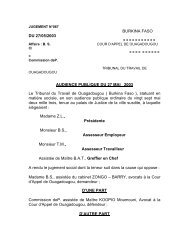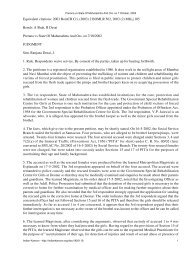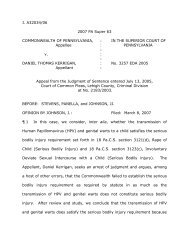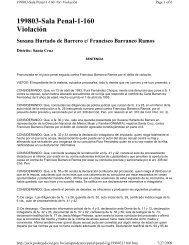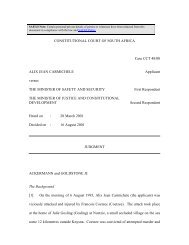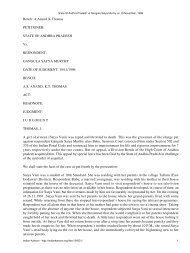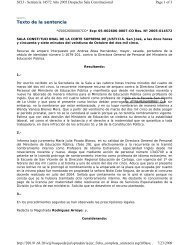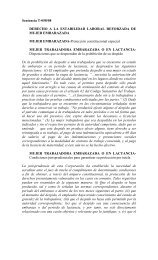P. Rathinam v. Union of India - Cornell University
P. Rathinam v. Union of India - Cornell University
P. Rathinam v. Union of India - Cornell University
- No tags were found...
You also want an ePaper? Increase the reach of your titles
YUMPU automatically turns print PDFs into web optimized ePapers that Google loves.
91. The basic argument <strong>of</strong> Shri Sharma, learned counsel for the <strong>Union</strong> <strong>of</strong> <strong>India</strong>, was that allowing persons tocommit suicide would be against public policy. Though which public policy would be so affected was notspelt out by the learned counsel, we presume that the public policy to be so jeopardised is one which requirespreservation <strong>of</strong> human life. One <strong>of</strong> the objects <strong>of</strong> punishment to be inflicted when an <strong>of</strong>fence is committed isprotection <strong>of</strong> society from the depredations <strong>of</strong> dangerous persons, as mentioned at p. 198 <strong>of</strong> Burton M.Leiser's Liberty, Justice and Morals. But ins<strong>of</strong>ar as suicide is concerned, this object does not get attractedbecause there is no question <strong>of</strong> protection <strong>of</strong> the society from depredation <strong>of</strong> dangerous persons, who by thevery nature <strong>of</strong> things have to be those who cause harm to others and not to themselves. Of course, we wouldconcede that one <strong>of</strong> the interests <strong>of</strong> the State has to be preservation <strong>of</strong> human life.92. The concept <strong>of</strong> public policy is, however, illusive, varying and uncertain. It has also been described as"untrustworthy guide", "unruly horse" etc. The leading judgment describing the doctrine <strong>of</strong> public policy hasbeen accepted to be that <strong>of</strong> Parke, B. in Egerton v. Brownlow 33 in which it was stated as below at p. 123, asquoted in paragraph 22 <strong>of</strong> Gherulal Parakh v. Mahadeodas Maiya34: "Public policy' is a vague andunsatisfactory term, and calculated to lead to uncertainty and error, when applied to the decision <strong>of</strong> legalrights; it is capable <strong>of</strong> being understood in different senses; it may, and does, in its ordinary sense, mean'political expedience' or that which is best for the common good <strong>of</strong> the community; and in that sense theremay be every variety <strong>of</strong> opinion, according to education habits, talents and dispositions <strong>of</strong> each person, who isto decide whether an act is against public policy or not. To allow this to be a ground <strong>of</strong> judicial decision,would lead to the greatest uncertainty and confusion. It is the province <strong>of</strong> the statesman and not the lawyer, todiscuss, and <strong>of</strong> the Legislature to determine what is best for the public good and to provide for it by properenactments. It is the province <strong>of</strong> the judge to expound the law only; the written from the statutes; theunwritten or common law from the decisions <strong>of</strong> our predecessors and <strong>of</strong> our existing courts, from text writers<strong>of</strong> acknowledged authority, and upon the principles to be clearly deduced from them by sound reason and justinference; not to speculate upon what is the best, in his opinion, for the advantage <strong>of</strong> the community. Some <strong>of</strong>these decisions may have no doubt bee nfounded upon the prevailing and just opinions <strong>of</strong> the public good; for instance, the illegality <strong>of</strong> covenants inrestraint <strong>of</strong> marriage or trade. They have become a part <strong>of</strong> the recognised law, and we are therefore bound bythem, but we are not thereby authorised to establish as law everything33 (1853) 4 HLC 12134 AIR 1959 SC 781 : 1959 Supp (2) SCR 406 425P.<strong>Rathinam</strong> vs <strong>Union</strong> Of <strong>India</strong> on 26 April, 1994which we may think for the public good, and prohibit everything which we think otherwise."93. In the aforesaid case a three-Judge Bench <strong>of</strong> this Court summarised the doctrine <strong>of</strong> public policy by statingat p. 795 that public policy or policy <strong>of</strong> law is an illusive concept; it has been described as "untrustworthyguide", "variable quality", "uncertain one", "unruly horse" etc.94. Different High Courts <strong>of</strong> the country have had also occasion to express their views on this concept in theirjudgments in Bhagwant Genuji Girme v. Gangabisan Ramgopal35; Mafizuddin Khan Choudhury v.Habibuddin Shekh36; Kolaparti Venkatareddi v. Kolaparti Peda Venkatachalam37 and Ratanchand Hirachandv. Askar Nawaz Jung38. In Kolaparti case37 it was stated that the term public policy is not capable <strong>of</strong> aprecise definition and whatever tends to injustice <strong>of</strong> operation, restraint <strong>of</strong> liberty, commerce and natural orlegal rights; whatever tends to the obstruction <strong>of</strong> justice or to the violation <strong>of</strong> a statute and whatever is againstgood morals can be said to be against public policy. These decisions have also pointed out that the concept <strong>of</strong>public policy is capable <strong>of</strong> expansion and modification. In Ratanchand case38 a Bench <strong>of</strong> Andhra PradeshHigh Court speaking through Chinnappa Reddy, J. as he then was, quoted at p. 117 a significant passage fromPr<strong>of</strong>essor Winfield, "Essay on Public Policy in the English Common Law" (42 Harvard Law Review 76). Thesame is as below: "Public policy is necessarily variable. It may be variable not only from one century to<strong>India</strong>n Kanoon - http://indiankanoon.org/doc/542988/ 20



